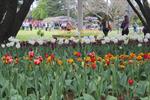
Does horticultural science appeal to you? How do you become a horticultural scientist?
Horticultural technicians and scientists need to have a strong foundation in both horticulture and science. They need to know how to identify lots of different plants, and the botany and chemistry that underpins an understanding of how to grow those plants.
This is a foundation course (first step) toward a career in horticultural science (e.g. technician, laboratory worker, technical advisor, consultant, research assistant, teacher, etc.).
Student Comment: "I have found the course to be interesting and challenging, with great learning materials that really make you research the industry and get involved. It has been a great way to study because it has allowed me to work in the industry and study at the same time. I have found the online resources to be fantastic, the tutors feedback constructive and the fact that assignments can be submitted online makes the process so easy." Tom Wood, Australia - Diploma in Horticultural Science course.
This course gives opportunities to the students looking 'outside of the square' and expand their careers in horticulture. Opportunities exist in management, teaching, research etc. Very appealing to those that have already worked in the field for many years and are looking for a new challenge. Also as relevant to those interested in horticulture but wanting to broaden their options.
“This fantastic course is for the serious horticulturist with a bent for science. However it also covers the more practical components of horticulture giving you an all round qualification. Opportunities abound for those completing this course – you can work in research, teach, or apply your skills to any industry sector.” - Adriana Fraser Cert.Hort., Cert.Child Care, Adv.Cert.App.Mgt., Cert IV Assessment and Training, Adv.Dip.Hort, ACS Tutor.
Develop a strong foundation in both horticulture and science - how to identify a wide range of plant species, plus the botany and chemistry that underpin the knowledge required to grow those plants.
Graduates may find employment as:
- A consultant
- A technician
- A teacher
- A research assistant.
This course is internationally accredited through I.A.R.C